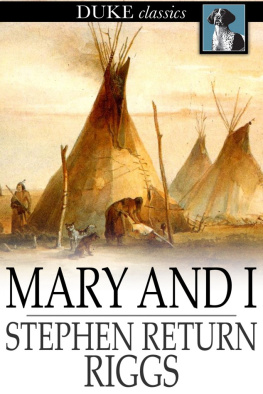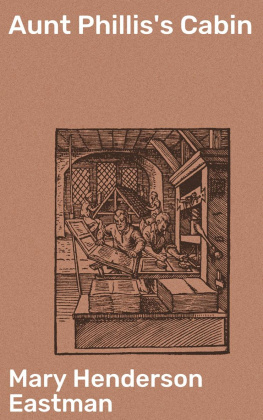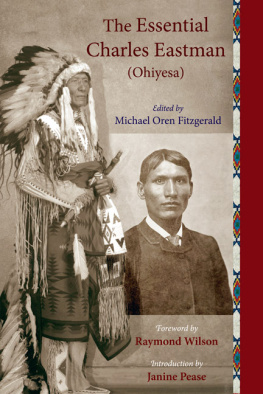PREFACE.
Table of Contents
My only title to the office of editor in the present case is some practice in such matters, with a very warm interest in all, whether relating to past or present, that concerns our western country. Mrs. Eastmanwife of Captain Eastman, and daughter of Dr. Henderson, both of the U. S. armyis thoroughly acquainted with the customs, superstitions, and leading ideas of the Dahcotahs, whose vicinity to Fort Snelling, and frequent intercourse with its inmates, have brought them much under the notice of the officers and ladies of the garrison. She has no occasion to present the Indian in a theatrical garba mere thing of paint and feathers, less like the original than his own rude delineation on birch-bark or deer-skin. The reader will find in the following pages living men and women, whose feelings are in many respects like his own, and whose motives of action are very similar to those of the rest of the world, though far less artfully covered up and disguised under pleasant names. "Envy, hatred and malice, and all uncharitableness," stand out, unblushing, in Indian life. The first is not called emulation, nor the second just indignation or merited contempt, nor the third zeal for truth, nor the fourth keen discernment of character. Anger and revenge are carried out honestly to their natural fruitinjury to others. Among the Indians this takes the form of murder, while with us it is obliged to content itself with slander, or cunning depreciation. In short, the study of Indian character is the study of the unregenerate human heart; and the writer of these sketches of the Dahcotahs presents it as such, with express and solemn reference to the duty of those who have "the words of eternal life" to apply them to the wretched condition of the red man, who is, perhaps, with all his ignorance, quite as well prepared to receive them as many of those who are already wise in their own eyes. The very degradation and misery in which he lives, and of which he is not unable to perceive some of the causes, prepare him to welcome the instruction which promises better things. Evils which are covered up under the smoothness of civilization, stand out in all their horrible deformity in the abandon of savage life; the Indian cannot get even one gleam of light, without instantly perceiving the darkness around him. Here, then, is encouragement to paint him as he is, that the hearts of the good may be moved at his destitute and unhappy state; to set forth his wants and his claims, that ignorance may no longer be pleaded as an excuse for withholding, from the original proprietor of the soil, the compensation or atonement which is demanded at once by justice, honor, and humanity.
Authentic pictures of Indian life have another and a different value, in a literary point of view. In the history and character of the aborigines is enveloped all the distinct and characteristic poetic material to which we, as Americans, have an unquestioned right. Here is a peculiar race, of most unfathomable origin, possessed of the qualities which have always prompted poetry, and living lives which are to us as shadowy as those of the Ossianic heroes; our own, and passing awaywhile we take no pains to arrest their fleeting traits or to record their picturesque traditions. Yet we love poetry; are ambitious of a literature of our own, and sink back dejected when we are convicted of imitation. Why is it that we lack interest in things at home? Sismondi has a passage to this effect:
"The literature of other countries has been frequently adopted by a young nation with a sort of fanatical admiration. The genius of those countries having been so often placed before it as the perfect model of all greatness and all beauty, every spontaneous movement has been repressed, in order to make room for the most servile imitation; and every national attempt to develop an original character has been sacrificed to the reproduction of something conformable to the model which has been always before its eyes."
This is certainly true of us, since we not only adopt the English view of everything, but confine ourselves to the very subjects and imagery which have become consecrated to us by love and habit. Not to enter into the general subject of our disposition to parrotism, our neglect of Indian material in particular may be in part accounted for, by our having become acquainted with the aborigines after the most unpoetical fashion, in trying to cheat them out of their lands, or shooting them when they declined being cheated; they, in their turn, driven to the resource of the weak and the ignorant, counterplotting us, and taking, by means of blood and fire, what we would not give them in fair compensation. This has made our business relations very unpleasant; and everybody knows that when this becomes the case, it is hard for parties to do justice to each other's good or available qualities. If we had only read about the Indians, as a people living in the mountain-fastnesses of Greece, or the, broad plains of Transylvania, we should without difficulty have discovered the romantic elements of their character. But as the effect of remoteness is produced by time as well as distance, it is surely worth while to treasure up their legends for our posterity, who will justly consider us very selfish, if we throw away what will be a treasure to them, merely because we cannot or will not use it ourselves.
A prominent ground of the slight regard in which the English hold American literature, or at least one of the most plausible reasons given for it, is our want of originality, particularly in point of subject matter. It is said that our imitativeness is so servile, that for the sake of following English models, at an immeasurable distance, we neglect the new and grand material which lies all around us, in the sublime features of our country, in our new and striking circumstances, in our peculiar history and splendid prospects, and, above all, in the character, superstitions, and legends of our aborigines, who, to eyes across the water, look like poetical beings. We are continually reproached by British writers for the obtuse carelessness with which we are allowing these people, with so much of the heroic element in their lives, and so much of the mysterious in their origin, to go into the annihilation which seems their inevitable fate as civilization advances, without an effort to secure and record all that they are able to communicate respecting themselves.
And the reproach is just. In our hurry of utilitarian progress, we have either forgotten the Indian altogether, or looked upon him only in a business point of view, as we do almost everything else; as a thriftless, treacherous, drunken fellow, who knows just enough to be troublesome, and who must be cajoled or forced into leaving his hunting-grounds for the occupation of very orderly and virtuous white people, who sell him gunpowder and whiskey, but send him now and then a missionary to teach him that it is wrong to get drunk and murder his neighbor. To look upon the Indian with much regard, even in the light of literary material, would be inconvenient; for the moment we recognize in him a mind, a heart, a soulthe recollection of the position in which we stand towards him becomes thorny, and we begin dimly to remember certain duties belonging to our Christian profession, which we have sadly neglected with regard to the sons of the forest, whom we have driven before us just as fast as we have required or desired their lands. A few efforts have been made, not only to bring the poetry of their history into notice, but to do them substantial good; the public heart, however, has never responded to the feelings of those who, from living in contact with the Indians, have felt this interest in them. To most Americans, the red man is, to this day, just what he was to the first settlers of the countrya being with soul enough to be blameable for doing wrong, but not enough to claim Christian brotherhood, or to make it











